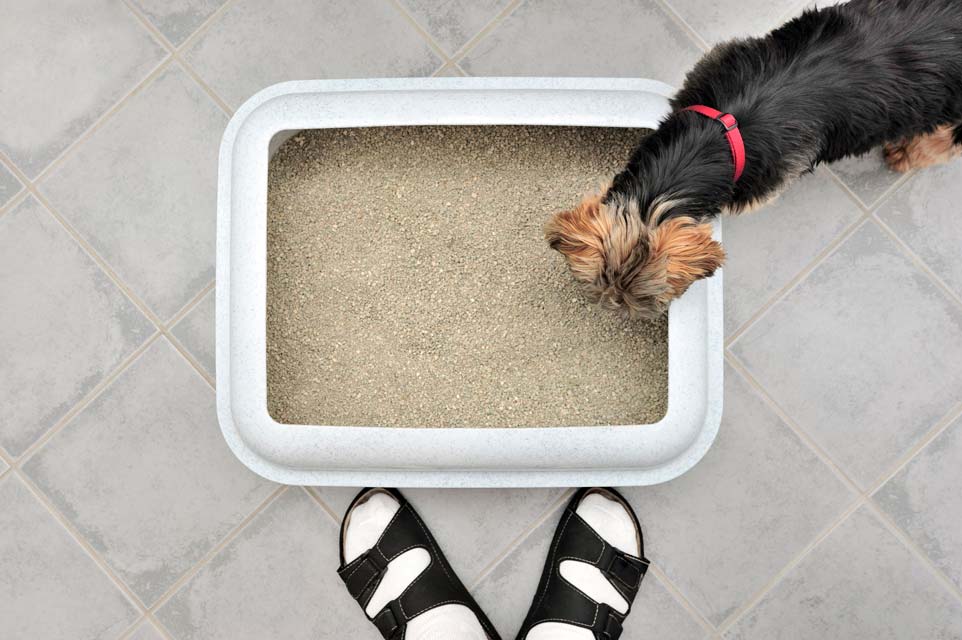Can You Litter Train a Dog?

One of the nice things about having a cat is they use a litter box. That means you don't have to adjust your schedule to be home at certain times to let them out, get up in the middle of the night to do so, or go out for potty breaks when the weather isn't good.
Most of the time, dogs do need to go outside routinely. But could they be trained to use a litter box inside like a cat?
The answer is yes. Most dogs can be trained to eliminate in a specific spot indoors. This can be a good thing if you have a small dog in a high rise apartment, don't have a good outdoor space for your dog to go, or work odd and sometimes long hours.
Some Dog Litter Is Similar to Cat Litter
Dog litter comes in a few different varieties, similar to cat litter. Some are made of recycled paper.
Regardless of the type of litter used, its job is to absorb liquid and mask some of the odor when a dog eliminates in it as well as provide an indoor spot that's appropriate for your dog to go.
One thing to keep in mind is that dogs don't usually automatically use litter like cats will. That's because the two species have different elimination habits in the wild. Cats often use soft sand to eliminate in, which is mimicked well by cat litter. But dogs often use grass or firmer substrates to eliminate on in nature.
Instead of litter, some dogs learn to eliminate on fake grass made for that purpose or on puppy pads or paper. The key is to create a space for your dog's elimination activities that's in an area your dog can get to easily, is in a quiet area, and is easy for you to get to and clean.
If you have a small dog and plan to use litter, a nice, big plastic tub or large cat litter box can work well.
Additionally, keep in mind that you don't want your dog's elimination substrate to be like other things in your home because that could confuse your dog. Don't choose something, for instance, that feels a lot like carpet.
In general, dog litter is only a good option for small dogs that fit into a litter box and only urinate small amounts. Big dogs can overwhelm and soak a litter box with one bladder elimination.
When deciding on which litter to use for your dog, be sure to choose something labeled non-toxic. Also, if your dog tends to eat things, using litter might not be a good option because if he ingests a large amount of dog litter, he could become sick or even suffer from a gastrointestinal obstruction.
How to Teach a Dog to Use Litter
If you're dealing with a puppy, litter training is done the same way any housetraining is. Take your puppy to the litter box often and give him a lot of praise when he eliminates in it. Keep him in a crate when you're not in direct supervision of him. Carry him to his litter every half hour or so, at least, and about ten minutes after meals.
It can confuse a puppy and lengthen training time to do both inside and outside elimination training simultaneously. It is usually faster to choose one to begin with and add the other once the dog is fully trained the first way.
If your dog is an adult and already trained to eliminate outside, it can be a little trickier to introduce him to litter or another type of indoor potty spot. You might consider taking the box or other substrate outside and directing your dog to it when you take him out. Once again, give big praise when he investigates the litter box or fake grass, and provide treats and super big praise if he eliminates in it. Slowly, you can move the litter inside as your dog gets used to using it.
Litter Box Care
Dogs don't bury their stool and urine naturally like many cats do. Because of that, odor control may not be as good when a dog uses a litter box as when a cat does. Ideally, you should scoop the box after each of your dog's eliminations. Add new, clean litter as needed, and wash the whole box with soap and water weekly.
You May Also Like These Articles:
General Tips for Keeping Your Dog Safe
10 Ways You Could Be Shortening Your Dog's Life - Slideshow
How Do You Stop a Dog from Barking?
Disclaimer: This website is not intended to replace professional consultation, diagnosis, or treatment by a licensed veterinarian. If you require any veterinary related advice, contact your veterinarian promptly. Information at DogHealth.com is exclusively of a general reference nature. Do not disregard veterinary advice or delay treatment as a result of accessing information at this site. Just Answer is an external service not affiliated with DogHealth.com.


